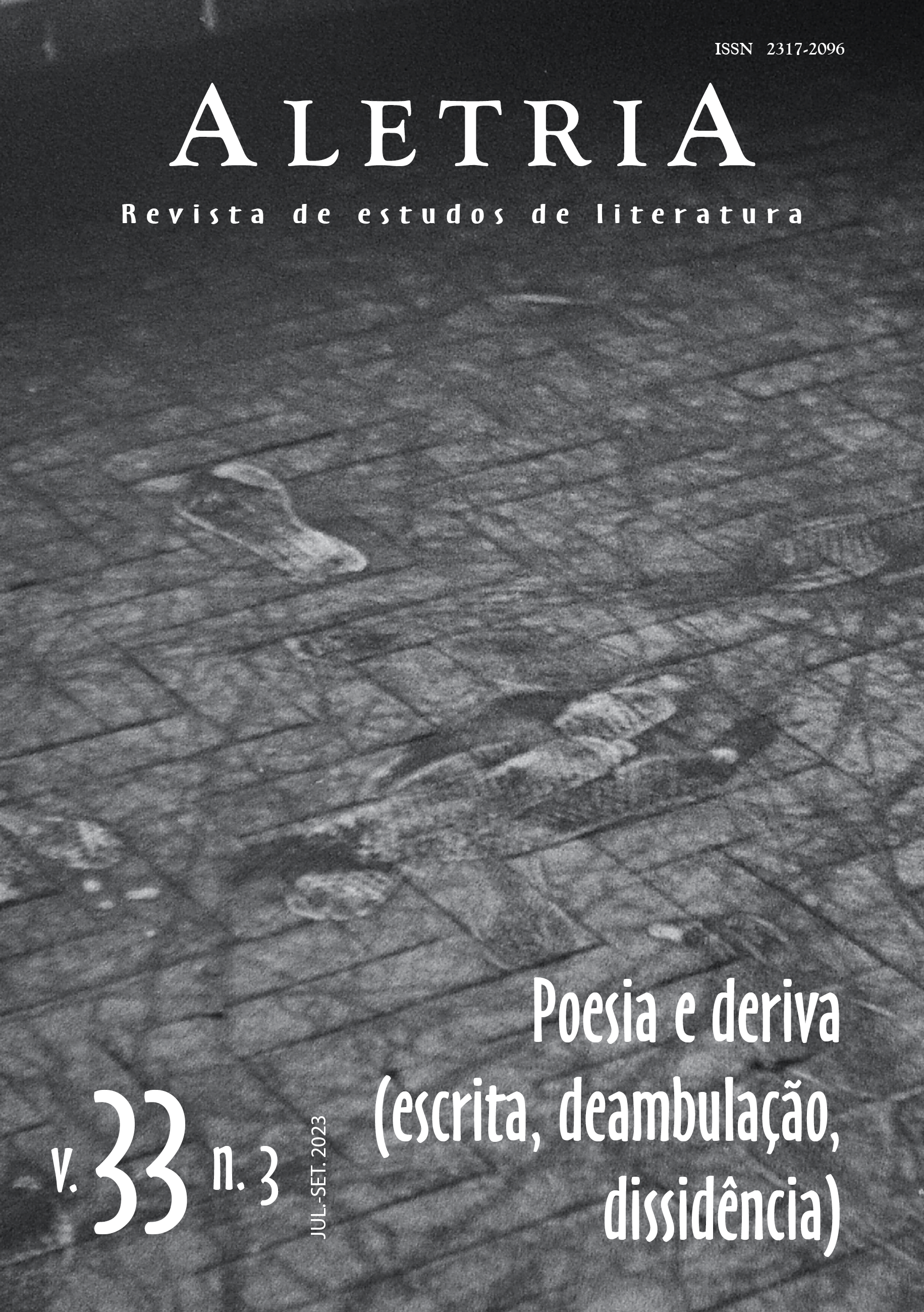The Thinking Poetry of Orides Fontela
Wandering as Poetic Language Experiment
Keywords:
Orides Fontela, drift, nomadism, poetry and philosophy, Deleuze and GuattariAbstract
The article aims to develop the idea of a poetics of drift in Orides Fontela’s poetry (1940-1998), in the sense of an experimentation of the thought of and in writing taking place not only in the thematic plan but, mainly, in the material of the poems. For this purpose, we seek a dialogue with some concepts of the French philosophers of difference Gilles Deleuze and Félix Guattari to think about the constitution of her writing-thought as a movement of ethical and poetic nomadism. Therefore, we focus on the analysis of two poems from the book Rosácea (1986), “Viagem” [“Travel”] and “Errância” [“Wandering”], both emblematic about this poetics of drift observable in the writing procedures and in the type of subjectivity created by the poems: subjectivity always outside of itself and in a constant process of constitution and deviation.
Downloads
References
AGAMBEN, Giorgio. Experimentum linguae: l’expérience de la langue = Experimentum linguae: a experiência da língua. Trad. Cláudio Oliveira. Rio de Janeiro: Circuito, 2018.
ALVES, Nathaly Felipe Ferreira. O lirismo objetivo de Orides Fontela. 2022. 1 recurso online (212 p.) Tese (doutorado em Teoria e História Literária) – Universidade Estadual de Campinas, Instituto de Estudos da Linguagem, Campinas, SP.
ARRIGUCCI JR. Davi. Na trama dos fios, tessituras poéticas. [Entrevista]. Jandira: Revista de Literatura, São Paulo, n. 2, p. 113-123, 2005.
BARRENTO, João. O mistério do encontro. In: CELAN, Paul. Arte poética: o Meridiano e outros textos. Trad. João Barrento e Vanessa Milheiro. Lisboa: Cotovia, 1996.
COLLOT, Michel. A matéria-emoção. Trad. Patricia Souza Silva. 1 ed. Rio de Janeiro: Oficina Raquel, 2018.
DELEUZE, Gilles; GUATTARI, Félix. Capitalisme et schizophrénie 1: L’Anti-Œdipe. Paris: Minuit, 1972.
DELEUZE, Gilles; GUATTARI, Félix. Mille Plateaux: capitalisme et schizophrénie. Paris: Minuit, 1980.
DELEUZE, Gilles; GUATTARI, Félix. Qu’est-ce que la philosophie? Paris: Minuit, 1991.
DELEUZE, Gilles; GUATTARI, Félix. Mil platôs: capitalismo e esquizofrenia. Trad. Aurélio Guerra Neto e Celia Pinto Costa. São Paulo: Editora 34, v. 1, 1995.
DELEUZE, Gilles; PARNET, Claire. Diálogos. Trad. Eloisa Araújo Ribeiro. São Paulo: Escuta, 1998.
DELEUZE, Gilles. L’Île déserte et autres textes. Paris: Minuit, 2002.
FONTELA, Orides. Poesia completa. Luís Dolhnikoff (org.). São Paulo: Hedra, 2015.
GIL, José. Fernando Pessoa ou a metafísica das sensações. Lisboa: Relógio D’Água, 1996.
NUNES, Benedito. Passagem para o poético: filosofia e poesia Heidegger. São Paulo: Ática, 1986.
PESSOA, Fernando. Livro do desassossego. Ed. Jerónimo Pizarro. Lisboa: Tinta-da-China, 2014.
RIAUDEL, Michel. Entretien avec Orides Fontela. In: QUINT, Anne-Marie (org.). Le conte et la ville: études de littérature portugaise et brésilienne. n. 5. Paris: Presses de la Sorbonne Nouvelle, 1998.
Downloads
Published
How to Cite
Issue
Section
License
Copyright (c) 2023 Nathaly Felipe Ferreira Alves, Annita Costa Malufe (Autor)

This work is licensed under a Creative Commons Attribution 4.0 International License.
Authors who publish with this journal agree to the following terms:Authors retain copyright and grant the journal right of first publication with the work simultaneously licensed under a Creative Commons Attribution Non-Commercial No Derivatives License that allows others to share the work with an acknowledgement of the work's authorship and initial publication in this journal.Authors are able to enter into separate, additional contractual arrangements for the non-exclusive distribution of the journal's published version of the work (e.g., post it to an institutional repository or publish it in a book), with an acknowledgement of its initial publication in this journal.Authors are permitted and encouraged to post their work online (e.g., in institutional repositories or on their website) prior to and during the submission process, as it can lead to productive exchanges, as well as earlier and greater citation of published work (See The Effect of Open Access).





